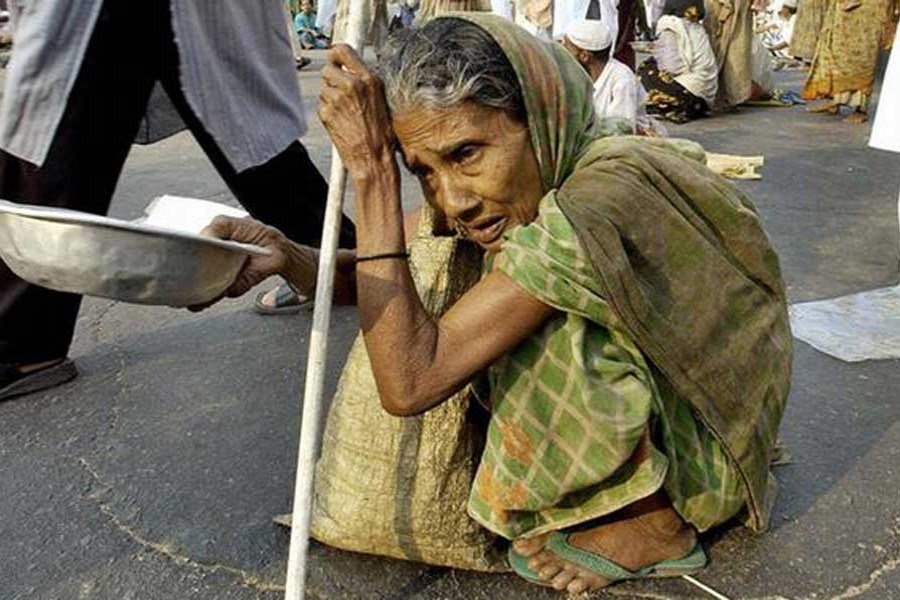
Published :
Updated :

“I was hanging out with a friend of mine at TSC, University of Dhaka (DU). Two children of 7-8 years came and literally harassed us. They taunted us in an aggressive manner to get money and, in the end, we had to give them Tk 20 reluctantly to avoid embarrassment in front of the mass of people.”
Tajmin Jahan, who is currently a sophomore from Development Studies, DU, shared this experience in a conversation with the writer.
She also expressed frustration over the fact that this does not happen occasionally, rather it is an everyday phenomenon of her campus.
An increase in the number
Beggars are not a new problem in our society. A study conducted by 'Aged Street Beggars in Dhaka City' published in late 2019, by Prof Abdus Sattar of East-West University and Md Julio Gazi of North South University, stated that there are approximately 700,000 beggars in Bangladesh. Among them, almost 40,000 reside in the capital Dhaka itself.
The covid-19 has impacted this number at an increasing rate. According to a press conference by The Power and Participation Research Centre (PPRC) and the BRAC Institute of Governance and Development (BIGD), the pandemic made an impact on 2.45 crore people’s life as 14.75 per cent of the country's population are in poverty within one year. This has supposedly increased the number of beggars as well.
Utilitarian view on beggar issue
We can view it from the perspective of Jeremy Bentham’s Utilitarianism. This 18th-century English philosopher believed in maximising utility for the greatest number of people.
He also mentioned a balance of pleasure over pain. He came up with the idea of establishing a self-financed workhouse for the poor. The plan is to reduce the number of beggars on the streets.
He observed the presence of beggars reduces the pleasure of general people in two ways. Not only that some people feel uneasy when someone is begging, but also there are plenty of people for whom these beggars create sympathy.
The pain of sympathy also reduces our utility just like the feeling of uneasiness.
“I was sitting in a bus stuck in the traffic and suddenly a woman of approximately 60 years old came with a broken hand, asking for money. I felt bad for her but I could not help her as I did not get my own salary for the last 3 months,” said Nur- E Alam, coming from a middle-class family, who works in a garment factory in Dhaka.
He mentioned that the beggars do not always create the feeling of annoyance for him, rather at times, he feels traumatic and sympathetic towards some of them who are begging just to get food. But people like him can not even help them because their own life is quite miserable and uncertain.
As a result, the beggars actually create a matter of dissatisfaction in either way to Nur-E Alam.
Rehabilitation initiatives
Bangladesh, in this regard, has taken several rehabilitation initiatives. For instance, in 2016, the country decided to rehabilitate 21,889 beggars in Khulna within December 2017.
In fact, a rehabilitation centre, with training and healthcare facilities, was set up on a 15-acre land where around 20,282 beggars were rehabilitated by May 2017.
Although Khulna became almost a beggar-free city in 2018, it did not last long.
Bentham’s solution
Bentham came up with the idea of rehabilitating them with individual efforts. This philosopher mentioned that if individuals who face issues can take initiative on their own.
Any citizen who encounters beggars would convince them and take them to the nearest workhouse/rehabilitation centre. Each beggar would have to work to pay his minimum cost for his/her own maintenance, which will be added to his ‘self-liberation account.’ The account will take care of his family, food, medical care, in fact, work as life insurance.
Now the question is, why would any citizen take this pain?
Well, the answer is an incentive. An incentive always leads to action. If any citizen manages to bring a beggar into the workhouse, he/she will get money which will be financed from the beggar’s account-- this could be an ideal solution.
The task might not be as easy as it sounds. However, it can be started experimentally in specific areas. If it proves successful, there will be no new generation of beggars in time, taking this as a family occupation.
tahseenjahan17@gmail.com


 For all latest news, follow The Financial Express Google News channel.
For all latest news, follow The Financial Express Google News channel.